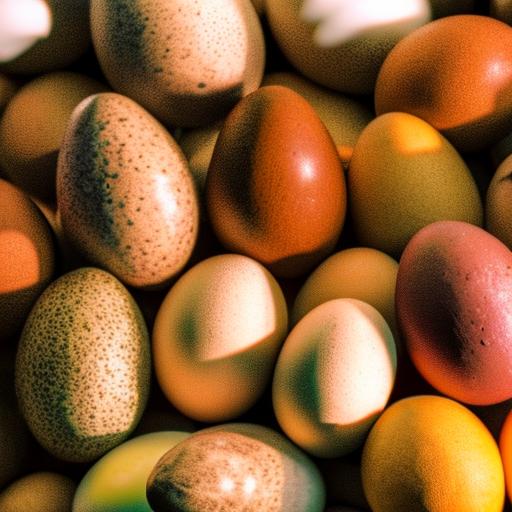When considering egg-laying chicken breeds, there are numerous options available, each with distinct characteristics. Popular breeds for egg production include Rhode Island Red, Leghorn, and Plymouth Rock, known for their high egg output, superior egg quality, and resilience. Less common breeds like Araucana, Marans, and Sussex are valued for their uniquely colored eggs and distinctive appearances.
Dual-purpose breeds, suitable for both egg production and meat, include Orpington, Wyandotte, and Australorp. These versatile breeds are ideal for those seeking chickens for both eggs and meat production. Selecting the appropriate breed requires a thorough understanding of each breed’s specific traits and characteristics to ensure it aligns with the intended purpose and requirements.
Table of Contents
Key Takeaways
- There are many different breeds of chickens, each with their own unique characteristics and traits.
- Some of the best breeds for egg production include the Rhode Island Red, Leghorn, and Sussex.
- Rare and unique breeds such as the Araucana and Marans can add variety and interest to your flock.
- Dual-purpose breeds like the Plymouth Rock and Orpington are great for both egg production and meat.
- When choosing the right breed for your needs, consider factors such as climate, space, and egg production goals.
- Breeding and raising chickens for eggs requires proper housing, nutrition, and health care.
- Tips for caring for egg-laying chicken breeds include providing a balanced diet, regular health check-ups, and a clean living environment.
Best Breeds for Egg Production
Top Breeds for Egg Laying
When it comes to egg production, some chicken breeds stand out from the rest due to their exceptional laying abilities. The Leghorn is one such breed, known for its prolific egg-laying capabilities, producing around 280-320 large white eggs per year. Another popular breed for egg production is the Rhode Island Red, which is known for its consistent egg production and excellent egg quality.
Consistent Egg Production
This breed typically lays around 200-300 brown eggs per year. The Plymouth Rock is also a top choice for egg production, known for its friendly disposition and ability to lay around 200-280 brown eggs per year. These breeds are highly sought after for their high egg production, making them ideal choices for those looking to raise chickens specifically for egg-laying purposes.
Factors to Consider
When considering the best breeds for egg production, it’s important to take into account factors such as egg size, color, and frequency of laying.
Rare and Unique Breeds
In addition to the more common egg-laying breeds, there are also rare and unique breeds that are prized for their distinctive characteristics and qualities. The Araucana, for example, is known for its ability to lay blue or green eggs, making it a popular choice among backyard chicken enthusiasts. The Marans is another unique breed, known for its dark brown eggs and striking appearance.
These rare breeds are highly sought after for their colorful eggs and make a great addition to any flock. The Sussex is another rare breed that is prized for its beautiful plumage and excellent egg-laying abilities. This breed is known for its friendly disposition and ability to lay around 250-280 light brown eggs per year.
These rare and unique breeds add diversity and interest to any flock and are a great choice for those looking to add some variety to their egg-laying chickens.
Dual-Purpose Breeds
For those looking to raise chickens for both eggs and meat, dual-purpose breeds are an excellent choice. The Orpington is a popular dual-purpose breed known for its large size, gentle nature, and ability to lay around 180-200 brown eggs per year. In addition to its excellent egg-laying abilities, the Orpington is also prized for its flavorful meat, making it a versatile choice for those looking to raise chickens for both purposes.
The Wyandotte is another dual-purpose breed that is known for its hardiness, cold tolerance, and ability to lay around 200-220 brown eggs per year. This breed is also valued for its meat production, making it a practical choice for those looking to raise chickens for both eggs and meat. The Australorp is yet another popular dual-purpose breed, known for its exceptional egg-laying abilities (around 250-300 brown eggs per year) as well as its delicious meat quality.
Choosing the Right Breed for Your Needs
When it comes to choosing the right breed of chicken for your needs, there are several factors to consider. First and foremost, it’s important to consider your specific goals and priorities. If you’re primarily interested in egg production, then breeds such as the Leghorn, Rhode Island Red, or Plymouth Rock may be the best choice for you.
On the other hand, if you’re looking for a dual-purpose breed that can provide both eggs and meat, then breeds like the Orpington, Wyandotte, or Australorp may be more suitable. It’s also important to consider factors such as climate, space availability, and personal preferences when choosing a breed. Some breeds are more cold-hardy or heat-tolerant than others, so it’s important to take your local climate into account when making your decision.
Additionally, some breeds are more docile and friendly, while others may be more independent or flighty. Considering these factors will help you choose a breed that aligns with your specific needs and preferences.
Breeding and Raising Chickens for Eggs

Selecting the Right Breeding Stock
When it comes to breeding chickens for egg production, it’s important to select breeding stock that exhibits the desired traits such as high egg production, good egg quality, and overall hardiness. By selecting the best breeding stock, you can improve the overall productivity and quality of your flock.
Providing Optimal Living Conditions
In terms of raising chickens for eggs, providing a balanced diet, clean water, proper housing, and regular veterinary care are essential for maintaining healthy and productive hens.
Nutrition and Environment
It’s important to provide a high-quality layer feed that is specifically formulated to meet the nutritional needs of laying hens. Additionally, providing access to fresh pasture or outdoor space can help improve the overall health and well-being of your flock.
Tips for Caring for Egg-Laying Chicken Breeds
Caring for egg-laying chicken breeds requires attention to detail and regular maintenance. Providing a clean and comfortable coop with proper ventilation, nesting boxes, and roosting space is essential for ensuring the health and well-being of your hens. Regularly cleaning the coop and replacing bedding will help prevent disease and maintain a healthy environment for your flock.
In addition to proper housing, providing a balanced diet that includes high-quality layer feed, fresh water, and access to grit and oyster shells is essential for maintaining healthy egg production. It’s also important to monitor your hens’ health regularly and seek veterinary care if any issues arise. By providing proper care and attention to your egg-laying chicken breeds, you can ensure a consistent supply of high-quality eggs from your flock.
If you’re interested in learning more about breeding ducks for eggs, check out this informative article on duck mating season. It provides valuable insights into the breeding habits of ducks and how to maximize egg production.
FAQs
What are the best chicken breeds for egg production?
Some of the best chicken breeds for egg production include the White Leghorn, Rhode Island Red, Plymouth Rock, and Australorp. These breeds are known for their high egg-laying capabilities and are popular choices for backyard egg production.
How many eggs can a chicken lay in a year?
On average, a chicken can lay between 200 to 300 eggs per year, depending on the breed and individual bird. Some high-producing breeds can lay even more eggs in a year.
At what age do chickens start laying eggs?
Chickens typically start laying eggs around 5 to 6 months of age, although this can vary depending on the breed and individual bird. Some breeds may start laying as early as 4 months, while others may take longer.
What factors can affect egg production in chickens?
Factors that can affect egg production in chickens include diet, lighting, temperature, stress, and overall health. Providing a balanced diet, proper lighting, and a stress-free environment can help maximize egg production in chickens.
How long do chickens continue to lay eggs?
Chickens can continue to lay eggs for several years, with peak production typically occurring in the first 2 to 3 years of their laying cycle. After that, egg production may gradually decline, but some chickens can continue to lay eggs into their later years.
Meet Walter, the feathered-friend fanatic of Florida! Nestled in the sunshine state, Walter struts through life with his feathered companions, clucking his way to happiness. With a coop that’s fancier than a five-star hotel, he’s the Don Juan of the chicken world. When he’s not teaching his hens to do the cha-cha, you’ll find him in a heated debate with his prized rooster, Sir Clucks-a-Lot. Walter’s poultry passion is no yolk; he’s the sunny-side-up guy you never knew you needed in your flock of friends!







